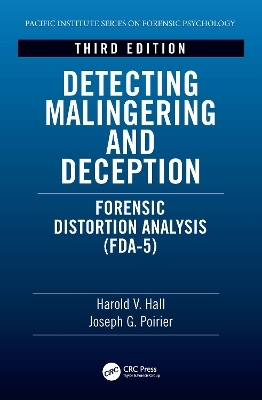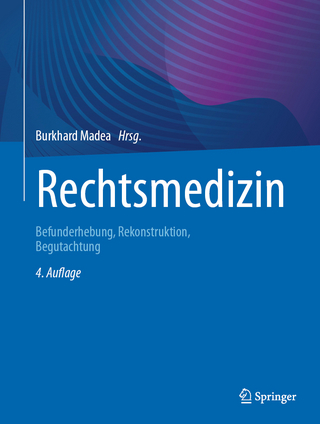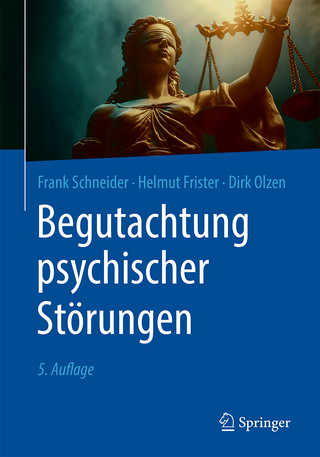
Detecting Malingering and Deception
CRC Press (Verlag)
978-1-138-39045-4 (ISBN)
Detecting Malingering and Deception: Forensic Distortion Analysis (FDA-5), Third Edition maintains the tradition of the prior two editions, following the Forensic Distortion Analysis (FDA) model. Fully updated since the last edition nearly 20 years ago, the book continues to serve as a comprehensive volume on deception and distortion in forensic, clinical and several specialized contexts.
As with the previous editions, the book presents a model of deception intended to be utilized and applied by the qualified evaluator. The proposed model covers targets of the faker, response styles shown, and methods to detect the deception. The goal is to summarize the historical and latest information on distortion detection, to present guidelines for detecting deception that include variable accuracy rates based on different detection techniques, and to stimulate further research of effective methods of deception detection. Recommendations and guidelines for the practicing clinician are offered throughout the book, including real-world cases to inform and enlighten, particularly in unique cases or those in which the certain outcomes are unexpected.
Key Features:
Outlines the role of the forensic professional in applying and integrating methods assessment in deception and distortion
Provides base-rates for deception-related behavior and events, especially useful in report writing or courtroom testimony as an expert witness
Presents the latest advances in methodology and technology to assist in the search for ground truth in applied settings and situations
Applies forensic distortion analysis to evaluate the deception-related findings and statements of other professionals involved in a particular case
New coverage includes sections on deception analysis for collectivities, including media groups, contemporary politics, cross-national corporations, conflict, and terrorism
Detecting Malingering and Deception incorporates the latest research, providing practical application to utilize information and evaluative methods as they pertain to deception-related settings and situations. Sample reports and extensive graphs, tables, charts, and histograms are provided, and every chapter has been updated with new studies and investigations. The Third Edition boasts several new chapters and updated working appendices of coverage to expand the exploration of deception addressing advances in the field, and our current understanding of the phenomenon.
Dr. Harold V. Hall, Ph.D., ABPP (Clin, Forensic), ABN (Neurospych) received his MS in psychology and his PhD in Clinical Psychology from Brigham Young University, Provo, Utah in 1972. For 15 years he worked in various federal and state clinics, health centers, hospitals, prisons and training schools, followed by over 30 years in Hawaii in the independent practice of civil and criminal forensic psychology and neuropsychology. Dr. Hall was a Fulbright Scholar in Poland, a Rotary Scholar in Thailand and Cambodia, and is a Distinguished Practitioner of the National Academy of Practice in Psychology. He has authored 15 books and over 100 peer reviewed journal articles, chapters, and reviews including 4 second editions in deception analysis, violence risk analysis, murder and manslaughter, and substance abuse. Dr. Joseph G Poirier, Ph.D., ABPP is currently a Clinical Psychologist Specialist in Rockville, Maryland. He was previously is the Clinical Director of the Child and Adolescent Forensic Evaluation Service (CAFES), Health and Human Services, Montgomery County Government, Rockville, Maryland. For 30 years, he had also been the co-director of the Circuit Court Mental Health Service, Prince Georges County, Maryland. He has testified as an expert witness in federal court and in district and circuit courts in a number of states. Dr. Poirier is triple board certified in forensic psychology, clinical psychology, and family psychology by the American Board of Professional Psychology. He is also a fellow of the American Psychological Association.
1. Foundational Issues of Deception 2. Involuntary Distortion 3. The Applied Forensic Analysis Model 4. Evaluation Process Guidelines 5. Deception and Nonverbal Behavior 6. Deception in Nonhumans 7. Children and Deception 8. Child Abuse and Deception 9. Deception in Adolescents 10. Deception and Elderly People 11. Civil Law and Deception 12. Malingered Neuropsychological Deficits 13. Faked Pain and Loss of Sensation 14. Post-Traumatic Stress Disorder and Deception 15. Interviewing and Interrogation 16. Criminal Profiling 17. Forensic Hypnosis 18. Competency and Deception 19. Criminal Responsibility and Deception 20. Faked Amnesia and Recall Skills 21. Psychosis and Deception 22. Hallucinations and Deception 23. Substance Abuse-Related Deception 24. Violence Risk Analysis and Deception 25. Conclusions and Expert Testimony 26. Media and Media Groups and Deception 27. Contemporary Politics and Deception 28. Terrorism and Deception 29. War and Deception 30. Trends and future directions
| Erscheinungsdatum | 29.06.2020 |
|---|---|
| Reihe/Serie | Pacific Institute Series on Forensic Psychology |
| Zusatzinfo | 46 Tables, black and white; 6 Line drawings, black and white; 52 Illustrations, black and white |
| Verlagsort | London |
| Sprache | englisch |
| Maße | 178 x 254 mm |
| Gewicht | 1160 g |
| Themenwelt | Geisteswissenschaften ► Psychologie |
| Medizin / Pharmazie ► Medizinische Fachgebiete ► Psychiatrie / Psychotherapie | |
| Studium ► 2. Studienabschnitt (Klinik) ► Rechtsmedizin | |
| Recht / Steuern ► EU / Internationales Recht | |
| Recht / Steuern ► Privatrecht / Bürgerliches Recht ► Medizinrecht | |
| Recht / Steuern ► Strafrecht ► Kriminologie | |
| ISBN-10 | 1-138-39045-3 / 1138390453 |
| ISBN-13 | 978-1-138-39045-4 / 9781138390454 |
| Zustand | Neuware |
| Informationen gemäß Produktsicherheitsverordnung (GPSR) | |
| Haben Sie eine Frage zum Produkt? |
aus dem Bereich


